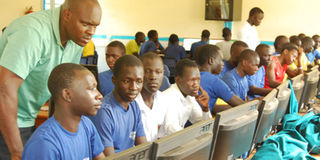Prime
Textbooks losing relevance to e-learning

Students of St Josephs College, Layibi in Gulu District in their computer library. Below, students of Paicho SS in Gulu during class in their computer library in June. Photo by Tobbias Jolly Owiny
What you need to know:
Curriculum specialists say the textbooks students use in the schools are outdated and should be replaced with e-learning to cater for the learning needs of the modern student.
If you went to school in the 80s and 90s, you probably remember the common textbooks that were more or less teachers’ companions to the classrooms. They were helpful then but today, their relevance is being questioned. This is because the world has evolved. The advancement of technology and ICT gives teaching and learning a new perspective.
Owing to this, Dr James Droti Asile, a senior consultant at the National Curriculum Development Centre (NCDC), says textbooks currently being used in secondary schools around the country have become irrelevant.
While in Gulu recently, Droti told this newspaper in an interview, that the books are no longer impactful on learners’ performance since they carry old and recycled content that does not make sense in the 21st Century learning environment.
“You get Atkinson in Chemistry or Physics’ Abbot, written in 1986 where the only thing that keeps changing is the cover yet no new content is being added or updated. Besides, they are full of foreign illustrations that are quite complex for Ugandan beginners,” Droti stated.
One major reason government is currently overhauling the O-Level curriculum is that the textbooks being used are not learner-friendly, he said.
“The current learning textbooks that were used to design the curriculum bore students a lot. Learners cannot concentrate on the books for long because they are too wordy, non-interactive and not age-appropriate,” Dr Droti said.
The poverty question
Charles Mawadri, the head teacher of Pakele Girls’ Primary School in Adjumani District, said they have to teach with those text books due to the level of poverty in the schools.
“Most of these textbooks, though outdated, are still relevant to us because we cannot afford to equip our facilities with ICT equipment such as laptops or tabs for learners. Where the school does not have the capacity to acquire the gadgets, it remains with the same old books,” he said.
Although Mawadri adds that the books are still relevant since the national curriculum design content from them, Robert Dima, the Adjumani District Education Officer, says e-learning is the way to go.
“Some schools, upon discovering that e-learning is the way to go, are slowly migrating from textbooks to use of technology and parents are increasingly enrolling their children in such schools that are and technologically equipped,” Dima said.
He blamed government for the old-fashioned textbooks saying the same are still being used in curriculum development. “The moment a country’s curriculum development is at a questionable level, it affects the level of learning and performance. If a curriculum encourages the use of such old books that is what schools will embrace,” he said.
E-learning switch
Surprisingly NCDC, the custodians of the curriculum, also agree that e-learning is the most ideal compared to the traditional textbooks because learners get highly motivated to read more when they have gadgets than with textbooks.
As such at the start of the year, they embarked on a pilot project in four schools within Kampala where they are establishing digital libraries.
To support the move, National Social Security Fund (NSSF) injected more than Shs450m to provide tablets to mainly underpriviledged secondary schools to enable them compete favourably with priviledged schools.
While rolling out the first tablets at Mpummudde Seed Secondary School in Jinja District, Richard Byarugaba, the NSSF managing director, said digital libraries will ease teaching and learning, especially in schools that face challenges of inadequate reading materials and facilities.
“The traditional education system is undergoing transformation owing to the ever advancing technology. Unfortunately, the use of technology in Uganda’s education system is almost non-existent especially in government-aided schools which are often underfunded,” he said.
Schools now use computers and tablets that are programmed to hold content (syllabuses) in all subjects for both O-Level and A-Levels.
Advancement
According to Dr Droti, these digital tablets are tailored to the school curriculum inclusive of all subjects fitted with virtual learning software subject to frequent modification.
“Schools that have been implementing e-learning have seen significant progress in learning among their students,” he said.
While using the tablet, at the end of each topic, students can do a self-assessment basing on the three levels of assessment and if the student fails the assessment, they are advised to retake and complete it.
“Initial reports from schools already implementing e-learning indicate that students who had the tablets scored very highly in Biology and Computer exams and these are just our pilot schools,” Dr Droti said.
And to support digital learning, NCDC together with Uganda Communication Commission (UCC) commenced on an exercise to establish fully equipped modern computer laboratories in more than 1,300 government-owned secondary schools across the country.
Nyombi Thembo, UCC’s director for Rural Communication and Development Fund, in an interview with this newspaper, said e-learning is the only way to transform learning in the country.
“ICT offers learners more practical ways to engage with the environment around them. We have embarked on a massive effort to equip schools with digital libraries to this regard,” he said.
The only challenge now is integrating learners with special needs to benefit from this development because we want an all-inclusive education system.



